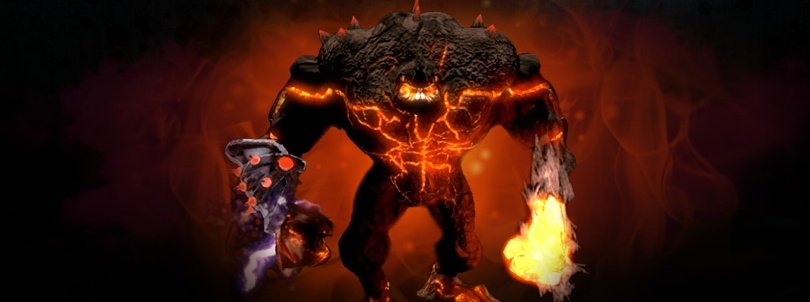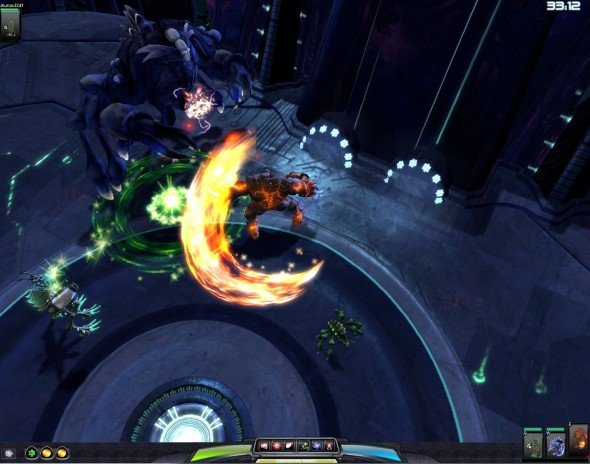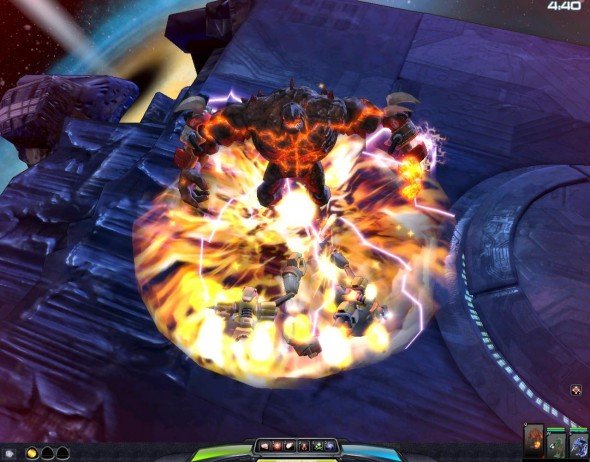Darkspore: home of lava-fisted space-Pokémon

Years ago, master game designer Will Wright's powerful brain turned its lobes to the subject of evolution, and Spore was born. Its incredibly powerful creature creator amazed us, but the mini-games that progressed you through the game's evolutionary stages failed to rope seasoned gamers. In hindsight, the current minds at Maxis understand that they'd made more of a toy than a game. So they've taken the best bits of Spore(the technology) and attached it to a game mechanic everyone loves: punching things to produce gold— or DNA, in this case. Maxis is making Spore-Diablo, which it's dubbed Darkspore.
“We're real, hardcore gamers. We love to play a lot of different kinds of PC games,” says Mike Perry, Darkspore executive producer. “We saw those tools we created for Spore and found them really inspiring. So we asked ourselves: what if we could take those tools and apply them to a core PC action game? What if you could play in co-op battles against an army of NPCs?”

You'd have an online, four-player, coop-focused dungeon-crawler, is what. Perry's team is very clear that Darkspore will be a different experience from its source material. “It's not a sequel to Spore. It's not a spin-off. It's a new game that uses the DNA of Spore to create a multiplayer online action game.”
Space Pokémon
The core concepts are lifted fromDiablo: loot, an isometric perspective and cooldowns tied to your combat abilities. TheSporetwist on that gameplay is that you manage a team of “genetic heroes,” taking three at a time to a planet to recover DNA (your currency for purchasing more heroes) and do battle with piles of varied aliens.
The level Perry's crawling over is a fragmented asteroid connected by bridges made of light. His three-creature squad is a grasshopper-like “Bio Tempest” gunner, a magma-skinned “Plasma Sentinel” brawler and a teleporting, stabby “Quantum Ravager” with blades on his hands. In Diablo terms, these are comparable to a mage, tank and rogue. Perry plays as only one at a time, but like in the action/side-scroller Trine, with a push of a button he can instantaneously swap between them using an ability with a short cooldown.
Perry is fighting a range of minions— enemies that range from hovering, prickly space pinecones to menacing blue ogres. A few of them have unique behaviors, like a pack of robotic enemies he stumbles on that tries to repair their fallen brethren whenever one is smacked to pieces. He uses that trait against them, waiting for the tiny droids to group up on a repair, then lays down a splashy area-of-effect fire punch ability with his Plasma Sentinel to wipe them all out at once. Clearing a room with a fireball feels great.

But interestingly, unlike Spore, these characters aren't entirely handmade— in Darkspore, you recruit your squad from a set of “hundreds” of premade creatures, then tack on hundreds of pieces of loot— including armor, shoulder pads, wings or gauntlets—to boost their stats and round out their combat personality. It's alien warrior dress-up. Spore's creature creator tech, however, is still intact in this part of character customization—the dev team shows me that you can free-adjust, resize, recolor, and even apply animated textures (like a glowing, magenta magma skin) to your gear. The same idea applies to enemies: they're premade, but there are heaps of them, all guided by a system similar to Left 4 Dead's AI director that will dynamically manage the type and count of enemies you'll have to mash.
Keep up to date with the most important stories and the best deals, as picked by the PC Gamer team.
That's good—but it didn't hide how dull Darkspore's environments felt. We wandered from symmetrical platters of open terrain, bare spaces that lacked the sense of discovery we're used to in most dungeon- crawlers. I'm concerned that the character-swapping mechanic will make combat feel less grounded, too. There's a looseness and sense of non-attachment to your character when you and three co-op partners each have a trio of heroes to alternate between. But we remain excited about its potential in a way we might not be for, say, Spore 2.

Evan's a hardcore FPS enthusiast who joined PC Gamer in 2008. After an era spent publishing reviews, news, and cover features, he now oversees editorial operations for PC Gamer worldwide, including setting policy, training, and editing stories written by the wider team. His most-played FPSes are CS:GO, Team Fortress 2, Team Fortress Classic, Rainbow Six Siege, and Arma 2. His first multiplayer FPS was Quake 2, played on serial LAN in his uncle's basement, the ideal conditions for instilling a lifelong fondness for fragging. Evan also leads production of the PC Gaming Show, the annual E3 showcase event dedicated to PC gaming.

